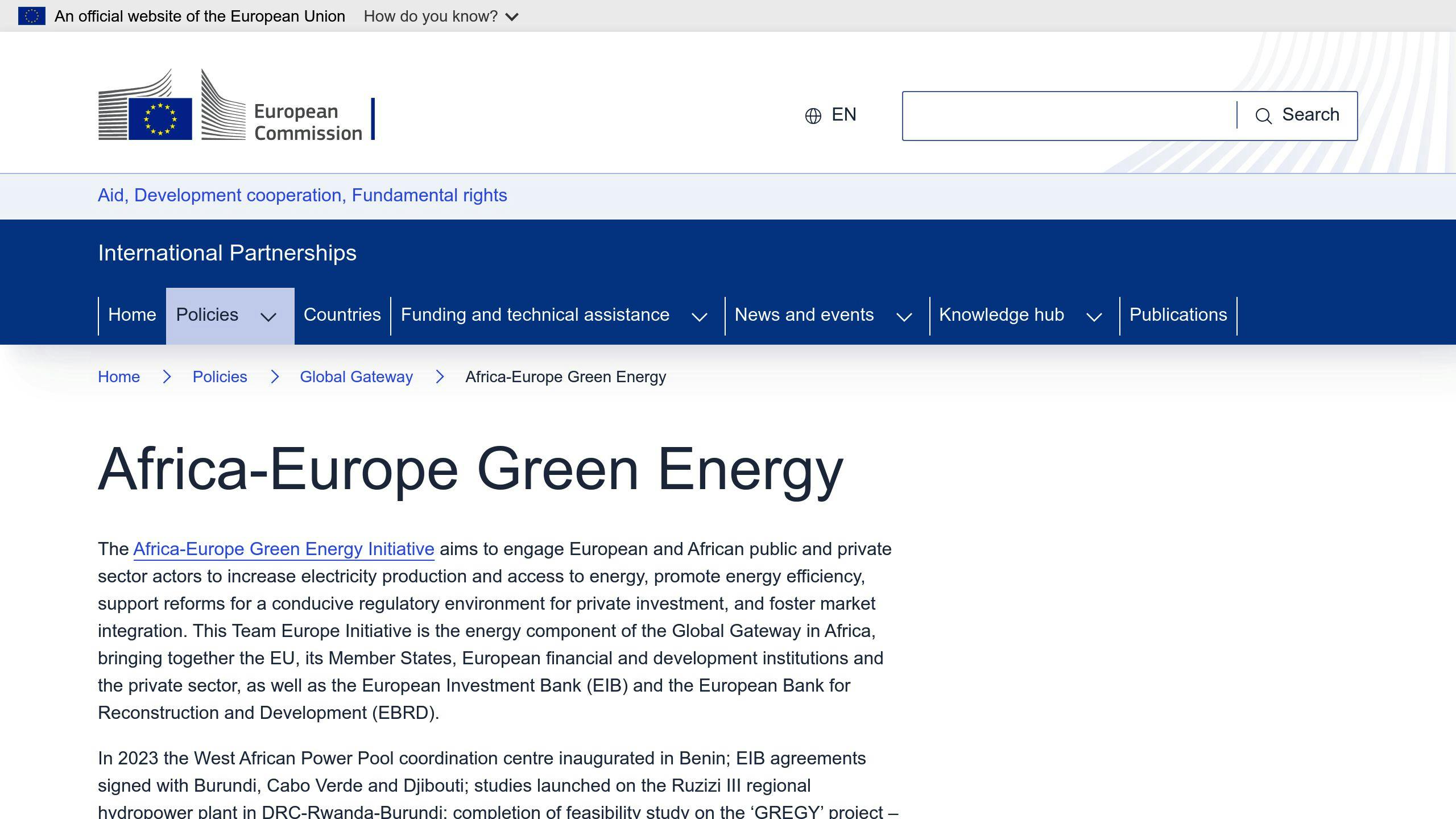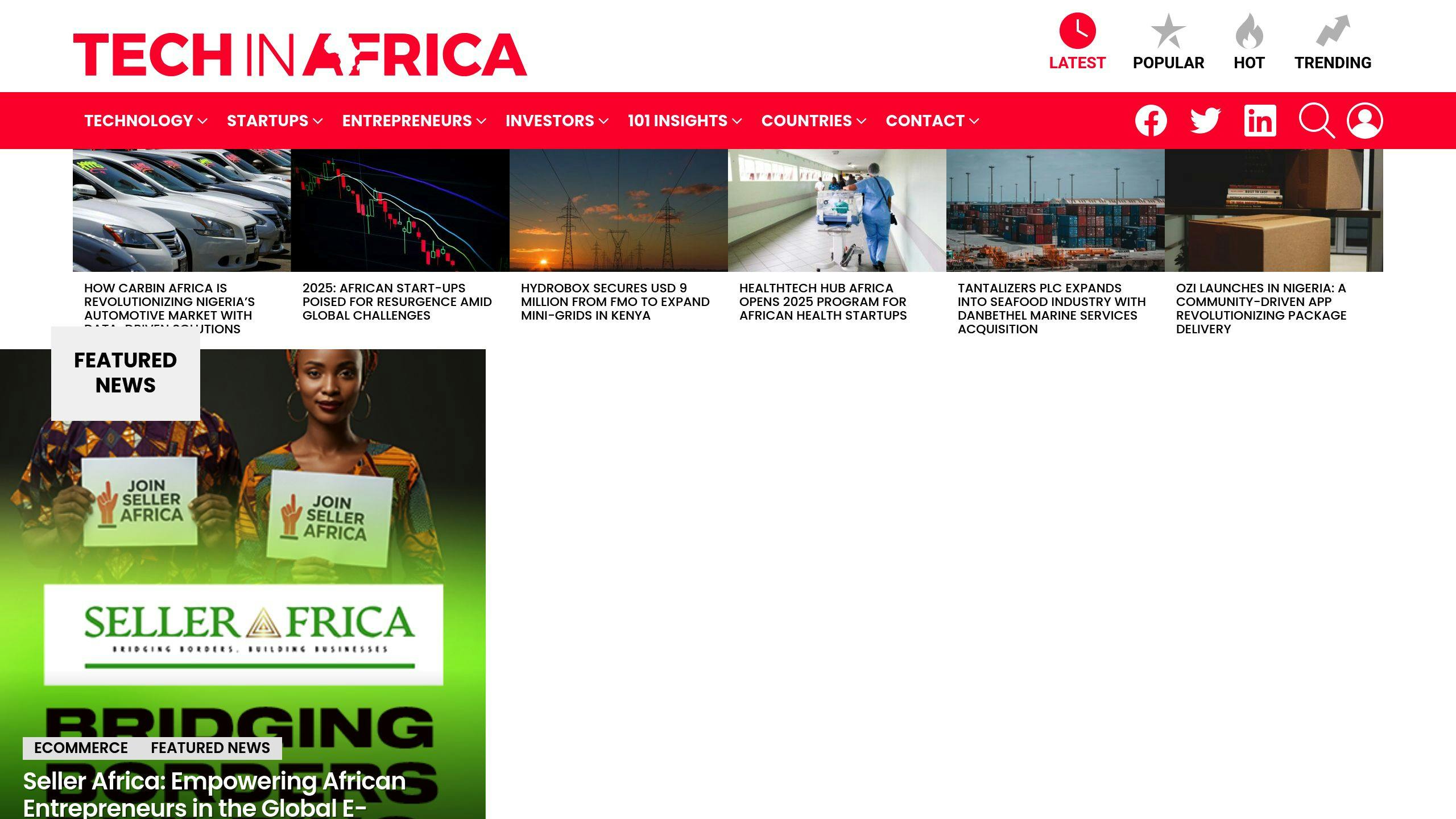Africa has 60% of the world’s best solar resources but uses just 1% of global solar PV capacity. Over 40% of Africans lack electricity, and 70% lack clean cooking fuels, highlighting an urgent need for renewable energy development. Global partnerships are key to bridging this gap by providing funding, policy support, and technical expertise. Initiatives like the Africa Energy Transition Program (AETP) and Africa-Europe Green Energy Initiative are driving progress by addressing a $31.5–$45 billion annual funding shortfall and improving energy access.
Key Highlights:
- Renewable Resources: Abundant solar and wind potential remain largely untapped.
- Global Support: Programs like APRA aim for 300 GW of renewable energy by 2030.
- Funding Gap: Africa needs $277 billion annually to meet climate goals.
- Policy Progress: 15 new energy laws adopted in 23 countries through partnerships.
- Technology: Emerging solutions like green hydrogen and smart grids attract investment.
Global collaboration is essential to unlock Africa’s renewable energy potential, reduce funding risks, and align local policies with global climate goals.
Africa’s pathway to a Just Energy Transition
Major Global Partnerships Driving Africa’s Energy Goals
Africa’s renewable energy sector is seeing rapid change, thanks to key international collaborations. These partnerships are addressing energy challenges through initiatives that focus on funding, policy changes, and technical support.
Accelerated Partnership for Renewables in Africa (APRA)
APRA is at the forefront of Africa’s renewable energy efforts, aiming to achieve 300 GW of renewable energy by 2030. This partnership emphasizes policy reforms and project development to draw private investments. By providing regulatory and technical assistance, APRA ensures projects are executed efficiently [1][4].
Building on APRA’s efforts, initiatives like the Africa-Europe Green Energy Initiative are also making strides in reshaping the energy landscape.
Africa-Europe Green Energy Initiative

This initiative is focused on expanding energy access across Africa through targeted solutions:
| Focus Area | Strategy | Outcome |
|---|---|---|
| Off-grid Solutions | Decentralized systems | Improved rural electrification |
| Smart Grid Technology | Upgraded infrastructure | Better energy efficiency |
| Private Investment | Risk reduction measures | Faster project funding |
“Through this timely partnership initiative, Europe has the opportunity to assume a more proactive role in enhancing Africa’s confidence and facilitating investments through climate finance”, says Dr. Kandeh Yumkella, Chairman of Sierra Leone’s Presidential Initiative on Climate Change [3].
Role of Development Finance Institutions (DFIs)
Development Finance Institutions (DFIs) like the European Investment Bank (EIB) are key players in Africa’s energy transformation. They provide long-term funding and manage risks, as seen in projects like Kenya’s Lake Turkana Wind Power project, which overcame major technical and financial obstacles with DFI backing [6][4].
DFIs help close funding gaps by offering concessional financing, sharing risks, and delivering technical support. Their influence is particularly strong in countries such as Ghana, Kenya, and Nigeria, where they have successfully mobilized large-scale funding and shaped policies crucial for energy transitions.
How Global Partnerships Shape Policies and Regulations
Global partnerships are playing a crucial role in reshaping Africa’s renewable energy landscape by focusing on policy development and regulatory improvements. For instance, the Africa Energy Transition Partnership works across the continent to support renewable energy initiatives and improve energy efficiency standards [1].
Aligning Policies with Global Goals
Aligning policies helps connect local needs with global climate objectives. This requires collaboration between African nations and international organizations to create effective regulatory frameworks.
| Policy Area | Partnership | Outcomes |
|---|---|---|
| Technical Standards | Africa Energy Transition Partnership | 15 new regulations adopted |
| Local Industry Development | Africa-Europe Foundation | Boosted critical minerals cooperation |
The United Nations Office for Project Services (UNOPS) has joined forces with Sustainable Energy for All (SEforALL) to offer technical assistance and policy guidance [1]. This partnership helps African countries create frameworks that attract investments while safeguarding local priorities.
Examples of Policy Success
Several African nations have reached important policy milestones through these collaborations. Countries like Ghana, Kenya, and Nigeria have implemented renewable energy policies that have successfully drawn in investments and technical expertise [3].
“Africa is rich in critical minerals while Europe has access to technology and skills. This dynamic presents a valuable opportunity for a win-win, mutually beneficial partnership”, says Marit Kitaw, Interim Director of the Africa Minerals Development Centre [3].
The Africa-Europe Foundation is advancing critical mineral development by promoting local value chains, sustainable standards, and green industrialization. Well-aligned policies not only bring in investments but also create frameworks that reduce financial risks for global stakeholders.
However, Africa’s renewable energy sector still faces a daunting funding gap of $35-50 billion annually, as noted by the African Development Bank (AfDB) [2]. While policy alignment is essential, addressing this financial shortfall remains a pressing challenge for global partnerships.
sbb-itb-dd089af
Funding Challenges and Opportunities in Africa’s Renewable Energy
Africa’s renewable energy transition comes with massive financial demands. The Climate Policy Initiative estimates that African nations require $277 billion each year from 2020 to 2030 to meet their nationally determined contributions under the Paris Agreement [2].
Addressing the Funding Gap
Development Finance Institutions are stepping up to tackle the funding shortfall with targeted programs. For instance, the South African Renewable Initiative (SARi) has secured $11.3 billion to develop 19 GW of renewable energy by 2030 [8]. To boost investor confidence, partnerships between African countries and global organizations are introducing new financing approaches, such as those under the European Union’s Global Gateway [9].
“APRA should be used to unlock affordable finances to support local private sector. The partnership should serve as a vehicle for green growth and green industrialisation which will generate meaningful socio-economic impact”, says Kornelia Shilunga, Namibia’s Deputy Minister of Mines and Energy [7].
In addition to traditional funding methods, advancements in technology are opening up fresh investment opportunities for Africa’s renewable energy sector.
Emerging Technologies and Investment Opportunities
International collaborations are fueling technological progress in Africa’s renewable energy space. One promising area is green hydrogen, supported by the Africa-Europe Green Energy Initiative. This initiative promotes technology sharing, local production, and strategies to minimize risks, creating a strong case for investment.
The Invest in African Energy (IAE) Forum in Paris serves as a key platform to connect African energy projects with global investors [9]. By highlighting technology-driven projects, the forum demonstrates how international partnerships can attract private sector funding and drive growth in the renewable energy field.
Technology Platforms Supporting Africa’s Energy Shift
Digital platforms are bridging the gap between innovators, investors, and policymakers, helping to drive energy solutions across Africa.
How Tech In Africa Makes a Difference

Tech In Africa monitors renewable energy projects and highlights key initiatives like the AETP, which secured $50 million to back energy policy development. By linking projects with investors and analyzing market trends, the platform encourages collaboration and investment in Africa’s energy landscape.
This work is crucial given that Africa currently attracts just 3% of global energy investments, despite being home to 17% of the world’s population [1]. Through its reporting, Tech In Africa actively works to close this gap, connecting African energy initiatives with international stakeholders.
| Platform Contribution Areas | Impact on Energy Transition |
|---|---|
| Project Visibility and Investment Facilitation | Showcases successful projects and links them with global investors |
| Innovation and Policy Updates | Shares details on new technologies and regulatory developments |
| Trend Analysis | Pinpoints investment and collaboration opportunities |
“The energy transition in Africa presents an unparalleled opportunity to address climate change and promote sustainable development. It is extremely vital that we think of how people access and consume energy, especially in regions where energy infrastructure does not adequately meet demand”, says Damilola Ogunbiyi, CEO and Special Representative of the UN Secretary-General for Sustainable Energy for All [5].
Conclusion: Strengthening Global Partnerships for Africa’s Energy Future
Key Takeaways
Collaborating internationally is essential for Africa’s shift to renewable energy. This transition is not only a chance to address global climate goals but also a pathway to economic growth. The Africa Energy Transition Partnership has secured $50 million to aid renewable energy policies in 23 countries, resulting in 15 new laws that align with global standards. These efforts highlight how partnerships can tackle Africa’s $31.5–$45 billion annual funding shortfall [1] [2].
| Focus Areas | Achievements |
|---|---|
| Policy Development | 15 Renewable Energy Laws Passed |
| Capacity Building | Support Provided to 23 Nations |
| Financial Support | $50M Secured from 10 Donors |
Supporting Ongoing Collaboration
“The success of global climate objectives is intrinsically linked to Africa realising its vast renewable energy potential”, says IRENA Director-General Francesco La Camera [10].
To build on existing programs like APRA and the Africa-Europe Green Energy Initiative, stakeholders should prioritize:
- Creating open and accountable partnerships that boost local economies
- Using regional strategies and advanced technology to speed up green industrial growth and knowledge sharing
- Encouraging private sector investments by minimizing financial risks
FAQs
What is the renewable energy Fund for Africa?
The Africa Renewable Energy Fund (AREF) supports renewable energy projects across Sub-Saharan Africa, focusing on sources like solar, wind, hydro, geothermal, and biomass. It operates throughout the region, excluding South Africa, and addresses the funding challenges in Africa’s renewable energy sector. Despite housing 17% of the global population, Africa receives only 3% of global energy investments [1].
AREF works alongside initiatives such as APRA and the Africa-Europe Green Energy Initiative to help turn policy goals into real projects. This approach highlights how financial tools can connect plans with actionable outcomes.
“The energy transition in Africa presents an unparalleled opportunity to address climate change and promote sustainable development.” – Damilola Ogunbiyi, CEO of Sustainable Energy for All










